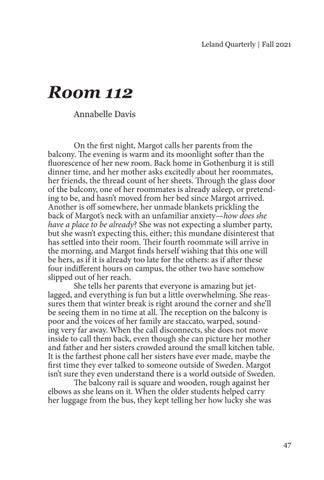Leland Quarterly | Fall 2021
Room 112 Annabelle Davis On the first night, Margot calls her parents from the balcony. The evening is warm and its moonlight softer than the fluorescence of her new room. Back home in Gothenburg it is still dinner time, and her mother asks excitedly about her roommates, her friends, the thread count of her sheets. Through the glass door of the balcony, one of her roommates is already asleep, or pretending to be, and hasn’t moved from her bed since Margot arrived. Another is off somewhere, her unmade blankets prickling the back of Margot’s neck with an unfamiliar anxiety—how does she have a place to be already? She was not expecting a slumber party, but she wasn’t expecting this, either; this mundane disinterest that has settled into their room. Their fourth roommate will arrive in the morning, and Margot finds herself wishing that this one will be hers, as if it is already too late for the others: as if after these four indifferent hours on campus, the other two have somehow slipped out of her reach. She tells her parents that everyone is amazing but jetlagged, and everything is fun but a little overwhelming. She reassures them that winter break is right around the corner and she’ll be seeing them in no time at all. The reception on the balcony is poor and the voices of her family are staccato, warped, sounding very far away. When the call disconnects, she does not move inside to call them back, even though she can picture her mother and father and her sisters crowded around the small kitchen table. It is the farthest phone call her sisters have ever made, maybe the first time they ever talked to someone outside of Sweden. Margot isn’t sure they even understand there is a world outside of Sweden. The balcony rail is square and wooden, rough against her elbows as she leans on it. When the older students helped carry her luggage from the bus, they kept telling her how lucky she was
47
